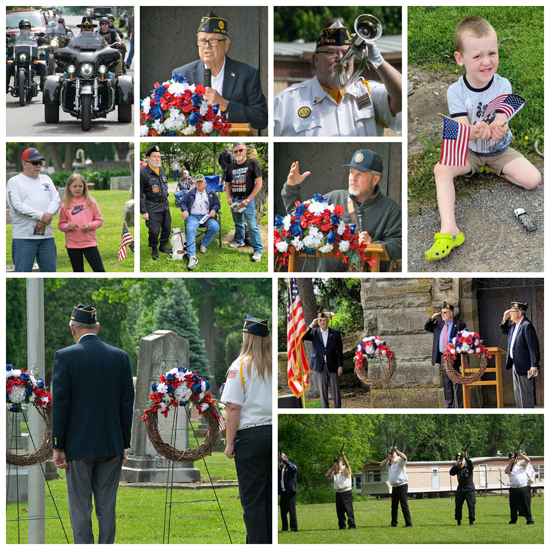Myers talks about PTSD on Memorial Day
DAVE MOSIER/independent editor
Area communities honored their fallen military veterans on Monday, with several veterans groups partnering for a memorial service in Woodland Cemetery that morning.

The local Amvets, Disabled American Veterans (DAV), American Legion, Sons of the Legion, and Veterans of Foreign Wars organizations were involved in the program, whose aim was to remember the sacrifices made by local veterans who made “the ultimate sacrifice.”
The Legion Riders led off the program as members rode their motorcycles in patriotic gear to where the memorial ceremony was being held.
American Legion Post 178 Commander Bill Marshall welcomed a nice crowd of attendees to the ceremony, while Legion Chaplain Dick Elder provided opening and closing prayers for the service.
Van Wert Mayor Ken Markward introduced the guest speaker: Clint Myers, a former U.S. Army Ranger who is director of the Legion’s PSTD program.
Myers’ talk was on “Generation Sacrifices” and he opened by talking about the sacrifices made in his own immediate family by his uncle and grandfather, both of whom were World War II veterans.
He first talked about his Uncle Howard, who earned a journalism degree from The Ohio State University and was made a lieutenant and tank commander. He was later killed when his tank exploded in a small French village not long after D-Day.
While Myers’ Grandfather Harold made it through the war, he suffered both physically and mentally from his experience in World War II. After returning to his unit after having his eardrums burst from an exploding mortar round, Myers’ grandfather was captured with his unit during the Battle of the Bulge and spent the remainder of the war in a German POW camp.
The mental and physical strain — the 6-4 GI weighed just 110 pounds when liberated from the POW camp — took a toll on his psyche.
“He didn’t die there (in the camp), but a part of him died there,” Myers said, noting that his grandfather remained in the hospital and in treatment for more than a year and a half after returning to the States after the war was over.
His grandfather’s experience also created suffering for Myers’ grandmother, who had also lost her brother during the war and was raising two children on her own while trying to cope with the changes her husband was going through.
“We don’t talk about that part,” Myers said, “the husband and wives who have to endure.”
While there have been more than 1 million American soldiers who have died since 1775, Myers said nearly half of those didn’t die on a battlefield. They died from disease or accidents or from the extremes of Mother Nature, which he called “one of your toughest foes when you’re in the military.”
While Americans are blessed today that, because of advances in medical treatment, fewer and fewer soldiers die on the battlefield, those that die there do leave behind families who suffer from their loss.
Myers talked about how battlefield soldiers must endure knowing that they could die at any time.
“That in itself causes stress, it changes your psyche, it changes your viewpoint,” he said.
However, Myers said that more and more soldiers are unable to deal with the trauma of war, with an average of 22 soldiers a day committing suicide.
“While we’re not losing as many in battle, we’re losing a bigger battle here at home,” he said. “Because they just don’t know how to deal with it anymore, they haven’t been able to talk about it, they’ve been told they can’t talk about it or they feel it’s not appropriate to talk about it, or they’re weak if they talk about what’s going on inside…”
Myers said the high number of suicides is a great tragedy.
“I think that’s a shame; 22 a day that we’re losing to suicide,” he said. “They make it through all that (war) and they come home and can’t figure out how to fit back in.”
It’s one of the reasons the Legion developed its PTSD program.
“We don’t do therapy there, we support one another, we educate one another, and we encourage: that’s what we do,” Myers said.
He also invited anyone suffering from PTSD, not just soldiers, but members of their families and others, to attend the meetings, which are held the first Monday of every month, starting at 8 a.m., at the Legion.
Following Myers’ speech, Ray Kiehl and Libby Gardner placed wreaths on the soldier’s memorial at Woodland Cemetery, and an honor guard comprised of members of local veterans groups provided a 21-gun salute and played “Taps” to end the service.
Veterans and their families were then invited back to the Legion for lunch.
POSTED: 05/31/21 at 11:56 pm. FILED UNDER: News







